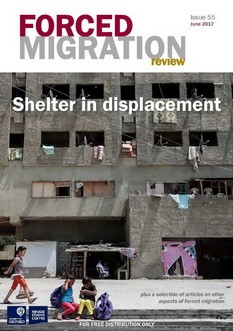Cluster vacancies
- Profile Shelter Cluster Coordinator - UN High Commissioner for Refugees.- Ongoing
Other Shelter Vacancies
- Global Shelter and Settlements Adviser - Norwegian Refugee Council - Application deadline: 13/06/2020
- Call for Experts Technical Assistance Project on Delivering Good Governance in Greece – Part I: Provide Support for the Improvement of Emergency Sheltering of Victims of Natural Disasters- Council of Europe EU (DG REFORM)
News
- Shelter & Settlements in emergencies, Natural Disasters Course - IFRC, deadline 31 March, 2020
- Humanitarian Logistics Master Programme - Open for applications, deadline 15 January, 2020
- RedR UK is running trainings on:
|
Date |
Course title and link for more info |
|
29th June - 26th July 29th June - 26th July 4th July - 13th July 6th July - 16th August 13th July-23rd August 15th -18th July 20th July 22nd-26th July 29th July-2nd August 7th-9th August 19th-23rd August 20th-22nd August Online self-paced Online self-paced |
Disaster Risk Reduction and Resilience in Urban Emergencies Introduction to Humanitarianism in Urban Settings So You Think You Want to be an Aid Worker Training of Trainers for the Humanitarian Sector Essentials of Humanitarian Practice Managing People and Projects in Emergencies |
Please contact Laura Clarke at Laura.Clarke@redr.org.uk for more information.
Publications
 Forced Migration Review issue 55 with a major feature on ‘Shelter in displacement’
Forced Migration Review issue 55 with a major feature on ‘Shelter in displacement’
All displaced people need some form of shelter. Whatever the type of shelter which is found, provided or built, it needs to answer multiple needs: protection from the elements, physical security, safety, comfort, emotional security, some mitigation of risk and unease, and even, as time passes, some semblance of home and community. This latest issue of FMR looks at the complexity of approaches to shelter both as a physical object in a physical location and as a response to essential human needs.
It also contains a selection of ‘general’ articles on other forced migration topics.
Read the full issue or individual articles online at www.fmreview.org/shelter (audio/podcast versions also available via this link) or email fmr@qeh.ox.ac.uk to request print copies for your organisation, or for onward distribution or for use in training. (If requesting print copies, please remember to send us your full postal address.)
This issue will be available in English, Arabic, French and Spanish.
Thanks to the following for their financial support for this issue: Better Shelter, Happold Foundation, Hunter and Stephanie Hunt, Norwegian Refugee Council, Open Society Foundations, Suricatta Systems, Swiss Federal Department of Foreign Affairs, UN-Habitat and UNHCR (DPSM).
 Spanning humanitarian responses from all over the world, Shelter Projects 2015-2016 is the sixth in a series of compilations of shelter case studies, overviews of emergencies and opinion pieces. The projects represent responses to conflict, natural disasters and complex or multiple crises, demonstrating some of the implementation and response options available. The book is intended to support learning by highlighting the strengths, weaknesses and some of the lessons that can be learned from different projects, which try to maximize emergency funds to safeguard the health, security and dignity of affected people, whilst – wherever possible – supporting longer-term shelter needs and sustainable recovery. The target audience is humanitarian managers and shelter programme staff from local, national and international organizations at all levels of experience. Shelter Projects is also a useful resource for advocacy purposes, showcasing the work done by the sector, as well as for research and capacity-building activities.
Spanning humanitarian responses from all over the world, Shelter Projects 2015-2016 is the sixth in a series of compilations of shelter case studies, overviews of emergencies and opinion pieces. The projects represent responses to conflict, natural disasters and complex or multiple crises, demonstrating some of the implementation and response options available. The book is intended to support learning by highlighting the strengths, weaknesses and some of the lessons that can be learned from different projects, which try to maximize emergency funds to safeguard the health, security and dignity of affected people, whilst – wherever possible – supporting longer-term shelter needs and sustainable recovery. The target audience is humanitarian managers and shelter programme staff from local, national and international organizations at all levels of experience. Shelter Projects is also a useful resource for advocacy purposes, showcasing the work done by the sector, as well as for research and capacity-building activities.